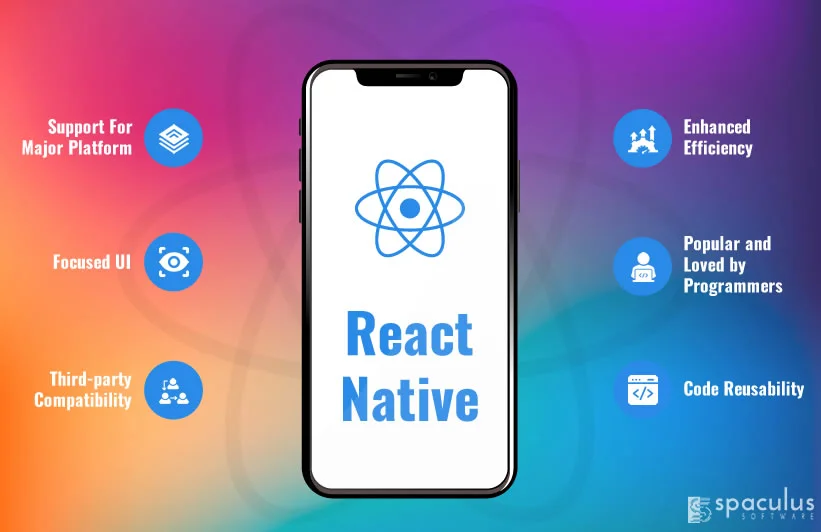Is React Native The Ideal Choice For Cross-Platform App Development?

What mobile app development technology will help achieve business goals is the decision every CTO mulls over. The technology affects the key factors associated with development cost, convenience, future maintenance, coding complexity and ultimate release. Among a few cross-platform frameworks, React Native allows you to deliver high-quality apps for both iOS and Android platforms at faster pace.
Created by Facebook, React Native is an open-source technology that uses JavaScript and JSX for creating a functional native mobile app. The framework uses lesser resources than native iOS and Android languages (Java & Objective C) to create appealing UIs and native feel.
Here we will discuss significant pros and cons of React Native framework to determine if it is an ideal choice for cross-platform development.
Pros
Hot reloading means speed
Unlike typical native apps, React Native has debugging that is not tedious and tiring. Design process gets massive boost as visualization of the creation becomes easier. React Native offers hot reloading, a feature that allows code changes to reflect in iOS and Android apps immediately. As a result, React Native developers are able to quickly see how the changed code affects the app during its running state. Thus, waiting time for changes to take effect is negligible, which accelerates the process speed.
Uneclipsed native-like performance
Native controls and modules offered by React Native contribute to performance improvement and deliver native-live experience. During the app run, React Native interacts with native components of respective device platform to directly render code to its native API. This phenomenon of RN using the native APIs eventually nudges the performance up.
React Native does not limit your experience with native-style wrapper for browser-based apps. As it uses native components, the app created with it feels and looks very real and native. The final product is so subtle you will not be able to find difference between an app built with RN or any Android or iOS programming language.
Ready-made Components
Another exciting pro of React Native is the Ready-to-apply components which you can use instead of writing code from scratch. These components come handy when developers need to speed up and simplify the process and build simple forms of functionalities. Thus the framework also helps make the process slim with small development cycle.
Economical investment
Being a cross-platform technology, React Native allows you to share good portion of codebase across iOS and Android platforms. platforms. This is beneficial even when many of your app features are quite different for both OS. This becomes a competitive cost-saving factor. Developers feel comfortable targeting multiple OS with only minimum amount of coding efforts. This means you can have budget-friendly operations where there is no need to specially hire specialized professionals for various OS development requirements.
Thriving Community
Since React Native is an open source project, any developer who has unique offering can contribute to the framework. The community is rich, full of experienced developers who you can approach for quick issue resolution. There is a positive chance that you will get right guidance from RN experts out there.
Worriless app update release
Usually, new app updates do not get published n App store and go through a stringent approval process. Apple has liberalized their strictness around review time, though. React Native makes it even easier and faster to release app updates to App Store. JavaScript enables automatic check for the updates to download latest version releases which makes releasing new updates to apps convenient and way faster.
Stable and Robust apps
React Native makes sure the apps are stable, functional and robust since its data binding protects the accessibility to parent data. When there is a need to change any object, developers would modify the state to apply new updates, which adds control to how much of components can be changed.
Due to its incredible quality, reliability and performance stability, big brands like Facebook, Walmart, Instagram, Airbnb, Skype and a few others rely on React Native for their apps.
Cons
Facebook’s regime
The fact that React Native is a proprietary of Facebook, we can’t help but think that development will be jeopardized once Facebook withdraws its support. The power and competitiveness will fall short if that actually materializes though, as major big companies depend on it, this does not appear to happen soon.
Shortage of third-party components
React Native, albeit quite usable, is still a smaller platform than iOS and Android that have large communities and ready-made third-party library and APIs in case you need an immediate solution. RN is not equipped with as much third-party components that work in expected fashion or that are have community enough to be updated frequently by creators.
Tough Learning Curve
A novice in React framework and JavaScript may find it hard to learn afresh the coding. There are hidden technical challenges while using JavaScript syntax. Hence, compared to other cross-platform alternatives, the path to knowledge about React Native involves a steep learning curve with good amount of practice and efforts.
Worries around security
Since React Native is JavaScript-based, building mobile banking or finance apps will involve challenges of security. JavaScript is a little infamous due to its vulnerability and requires you to take extra care and considerations when creating apps that need strong security. With high-priority apps, it is important to be vigilant about uninvited malicious code that can ruin your app’s healthy functionality.
Conclusion
In conclusion, considering all the pros and cons of resorting to React Native for cross-platform app development, we can be positive about Facebook’s app development framework. When it comes to experiencing simplicity, speed and affordability, any mobile app developer would favor React Native framework. Modern and sophisticated, React Native can handle intricate app with evolving resources. Its community is still growing, which means we can hopefully expect its cons to turn into pros with time. At the moment, Spaculus does consider React Native to be an ideal choice for developing apps for both iOS and Android. In future RN will offer more mature components using which we would be able to build advanced functionality and features.







